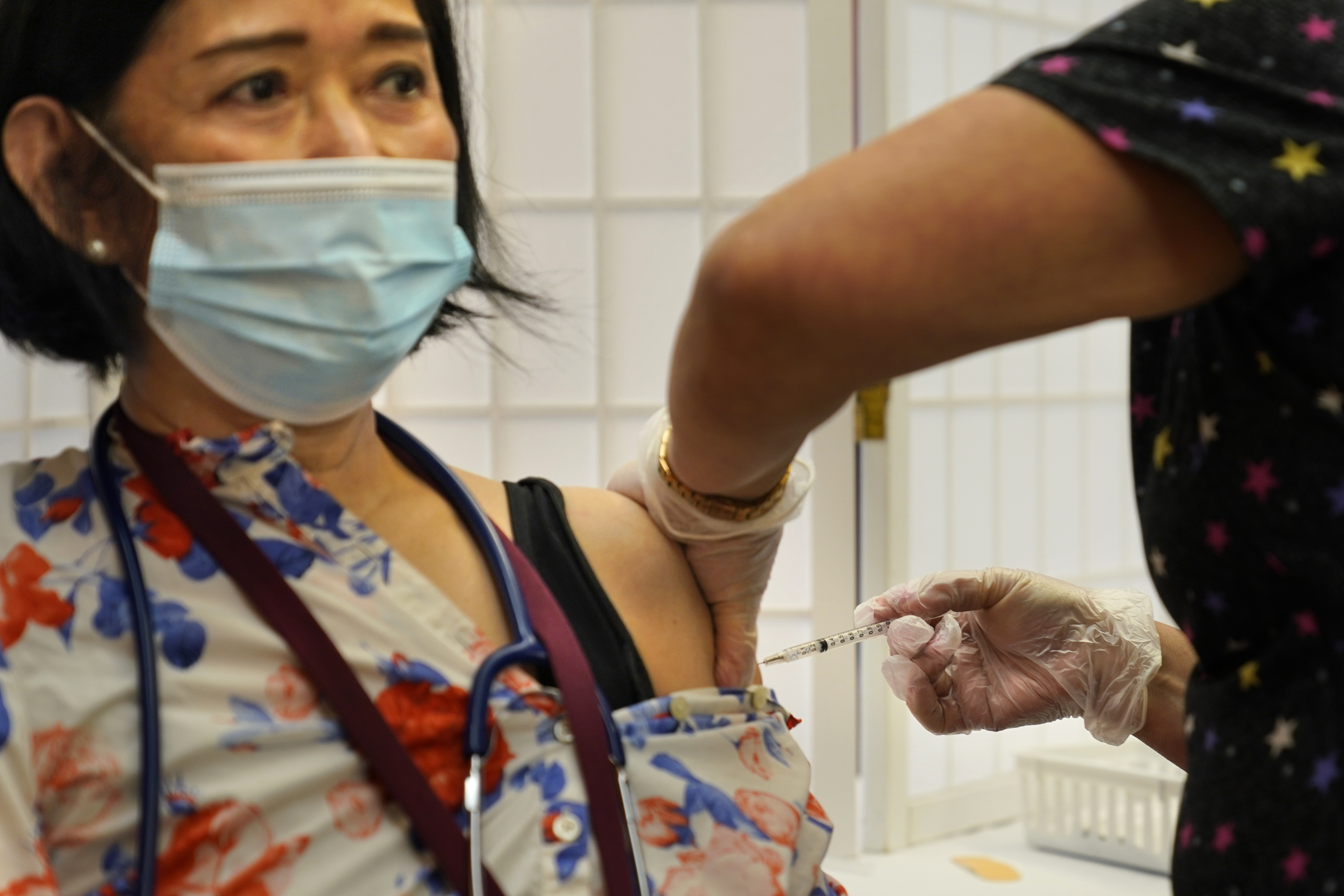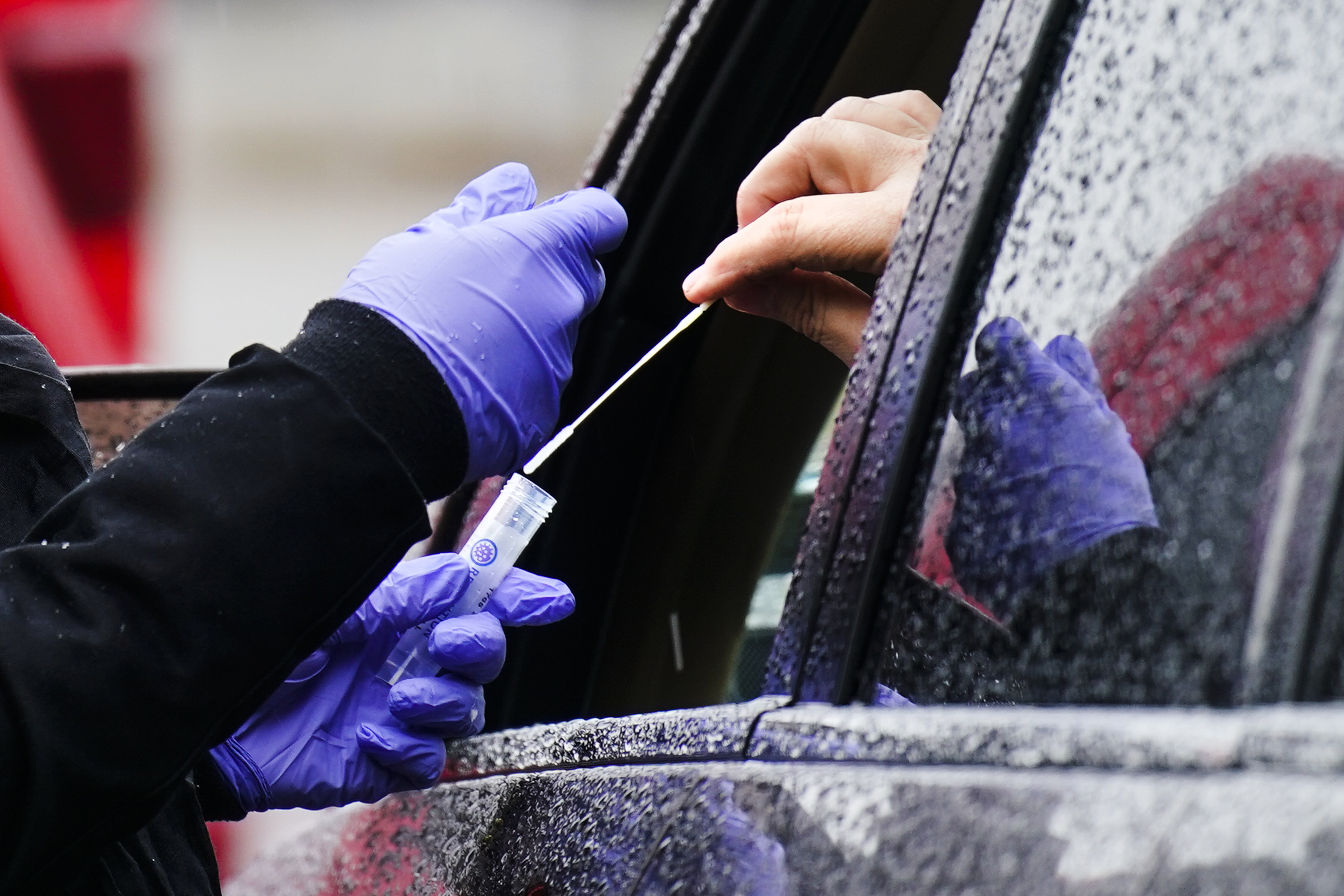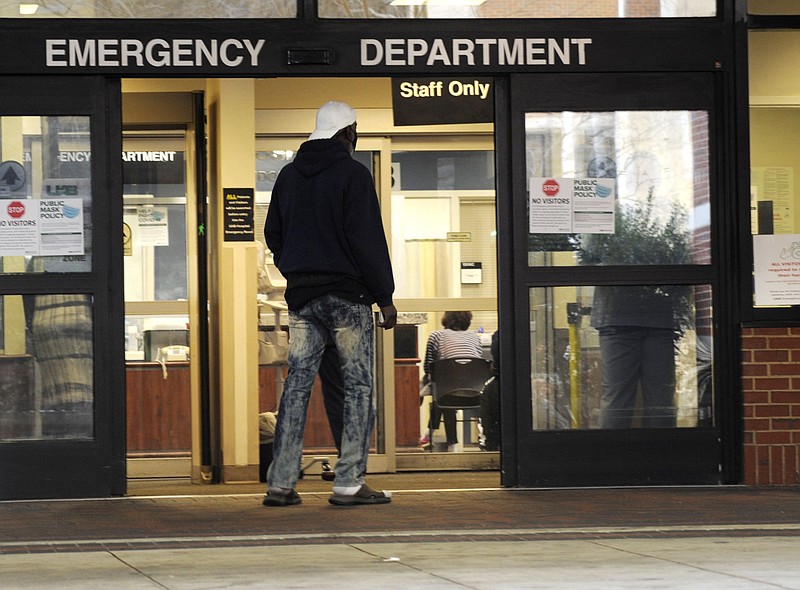Health care workers in about half of the states face a deadline today to get their first doses of the covid-19 vaccine under a Biden administration mandate that will be rolled out across the rest of the country in coming weeks.
While the requirement is welcomed by some, others fear it will worsen staffing shortages if employees quit rather than comply.
And in some Republican-led states that have taken stands against vaccination mandates, hospitals and nursing homes could find themselves caught between conflicting state and federal demands.
"We would like to see staff vaccinated. We think that it's the safest option for residents, which is our biggest concern," said Marjorie Moore, executive director of VOYCE, a St. Louis County, Mo., nonprofit that works on behalf of nursing home residents. "But not having staff is also a really big concern, because the neglect that happens as a result of that is severe and very scary."
The mandate affects a wide swath of the health care industry, covering doctors, nurses, technicians, aides and even volunteers at hospitals, nursing homes, home-health agencies and other providers that participate in the federal Medicare or Medicaid programs.
It comes as many places are stretched thin by the omicron surge, which is putting record numbers of people in the hospital with covid-19 while sickening many health workers.
Overall, the U.S. vaccination campaign has been sluggish. More than 13 months after it began, just 63% of Americans, or 210 million people, are fully vaccinated with the initial rounds of shots.
Vaccination numbers are stagnant in states such as Wyoming, Idaho, Mississippi and Alabama, which have been hovering below 50%.
Vermont is a national leader in the percentage of people who have been fully vaccinated and received booster shots. About 60% of the population over 18 has gotten boosters. But it's not enough, said Vermont Health Commissioner Mark Levine.
[Video not showing up above? Click here to watch » arkansasonline.com/127fauci/]
Nationwide, about 81% of nursing home staff members already were fully vaccinated as of earlier this month, ranging from a high of 98% in Rhode Island to a low of 67% in Missouri, according to the federal Centers for Medicare and Medicaid Services. The data is unclear about the vaccination levels in hospitals and other health care sites.
The mandate ultimately will cover 10.4 million health care workers at 76,000 facilities.
It is taking effect first in jurisdictions that didn't challenge the requirement in court. Those include some of the biggest states, with some of the largest populations of senior citizens, among them: California, Florida, New York and Pennsylvania.
In Florida, medical centers find themselves caught between dueling federal and state vaccination policies. They could lose federal funding for not adhering to the Biden administration mandate, but could get hit with fines for running afoul of state law.
Gov. Ron DeSantis last year signed legislation that forces businesses with vaccination requirements to let workers opt out for medical reasons, religious beliefs, immunity from a previous infection, regular testing or an agreement to wear protective gear. Businesses that fail to comply can be fined $10,000 to $50,000 per violation.
Asked if the state would pursue fines against hospitals that enforce the federal mandate, a spokeswoman for the Florida attorney general said all employee complaints "will be thoroughly reviewed by our office."
Some states already have their own vaccination requirements for health care workers. In California, for example, they have been required to be fully vaccinated since Sept. 30 and must get boosters by Tuesday.
[CORONAVIRUS: Click here for our complete coverage » arkansasonline.com/coronavirus]
The federal mandate is "better late than never," said Sal Rosselli, president of the National Union of Healthcare Workers, which represents about 15,000 people in California. "But if it happened sooner, we wouldn't have gone through the surge, and a lot more people would be alive today."
The government said it will begin enforcing the first-dose vaccination requirement Feb. 14 in two dozen other states where injunctions were lifted when the U.S. Supreme Court upheld the mandate two weeks ago. The requirement will kick in on Feb. 22 in Texas, which had filed suit separately.
In Missouri, one nursing home served notice this week that it intends to take advantage of a state rule that allows facilities to close for up to two years if they are short-staffed because of the vaccination requirement.
"Obviously we are proponents of vaccines," said Lisa Cox, a spokeswoman for the Missouri Department of Health and Senior Services. But "throughout all of this, we knew that mandating it would be a negative impact really on our health care system ... just because of crippling staffing levels."
Cox identified the facility that was closing as Cedarcrest Manor in Washington, Mo. She said there are just 42 patients in the 177-bed facility amid the staffing shortages.
A woman who answered the phone at the facility took a message but couldn't immediately comment.
The Centers for Medicare and Medicaid Services ultimately could cut off funding to places that fail to comply with the mandate. But it plans to begin enforcement with encouragement rather than a heavy hand.
The agency's guidance documents indicate that it will grant leniency to places that have at least 80% compliance and an improvement plan in place, and it will seek to prod others.
"The overarching goal is to get providers over that finish line and not be cutting off federal dollars," said MaryBeth Musumeci, a Medicaid expert with the nonpartisan Kaiser Family Foundation.
The states affected today are: California, Colorado, Connecticut, Delaware, Florida, Hawaii, Illinois, Maine, Maryland, Massachusetts, Michigan, Minnesota, Nevada, New Jersey, New Mexico, New York, North Carolina, Oregon, Pennsylvania, Rhode Island, Tennessee, Vermont, Virginia, Washington and Wisconsin, along with the District of Columbia and U.S. territories.
NAVY DISCHARGES
The Navy announced Tuesday that it has discharged 23 active-duty sailors for refusing to take the coronavirus vaccine, marking the first time it has thrown currently serving sailors out of the military over the mandatory shots.
The discharges came as the Navy released new covid-19 guidance that requires all deployed sailors and air crew to be vaccinated, but relaxes some quarantine practices on ships based on recommendations from the Centers for Disease Control and Prevention.
Navy leaders said all operational units -- meaning those involved in deployments out to sea -- must be 100% vaccinated, and any sailors who have approved medical or administrative exemptions are shifted to shore duty.
A significant majority of the Navy's force is in operational units, and the requirement rules out the use of any unvaccinated sailor -- such as a Navy SEAL -- on a deployed ship, even if they have an approved exemption or are seeking an exemption. A number of SEALs and other special warfare sailors have filed suit against the mandatory vaccination.
Speaking to reporters Tuesday, Vice Adm. William Merz, the Navy's deputy chief of operations, said there have been covid outbreaks on a number of ships, but they have been "statistically insignificant" and have had no impact on naval operations.
For the most part, he said, sailors have minimal symptoms, and -- particularly with the omicron variant -- the virus comes and goes quickly, allowing sailors to keep the ships fully staffed and running. He added that the Navy strongly recommends the booster vaccine and said it will likely become mandatory in the future.
Merz declined to say how many ships have seen outbreaks. He said the latest CDC guidelines, which shortened isolation times, have made it easier for ships to continue operating even if a small number of the crew becomes infected.
The Navy discharges come as the number of troops removed from the military because of vaccination refusals begins to climb across the services. The Marine Corps, as of late last week, had discharged 334 Marines, and the Air Force, as of this week, had discharged 111 airmen for refusing to get the shots. The Army is now the only service that has not yet discharged any active-duty personnel because of vaccine refusal.
The military services have been going through a methodical process to deal with those who refuse the vaccine as well as those who request medical, administrative or religious exemptions. The reviews require counseling with medical personnel and chaplains as well as senior commanders.
The number of troops discharged will begin to grow exponentially as those reviews finish and troops are given their final chances to get the vaccines. Lawsuits over the mandatory vaccine are also making their way through the courts.
The Air Force and Navy have also discharged entry-level service members going through their boot camps, who hadn't yet reported to their service jobs. There have been 22 Navy and 37 Air Force recruits who have been sent home.
All of the sailors received honorable discharges, the Navy said.
The Pentagon has ordered all service members -- active-duty, National Guard and Reserves -- to get the vaccine, saying it is critical to maintaining the health and readiness of the force.
PRISON ACCESS
Two U.S. senators said Wednesday that they were denied access to parts of a federal prison in Connecticut while trying to examine conditions there in response to correctional officers' complaints about a staffing shortage and lack of coronavirus precautions.
Concerns about the spread of covid-19 itself were behind the denial, the federal Bureau of Prisons said.
Sens. Chris Murphy and Richard Blumenthal, both Connecticut Democrats, visited the Danbury Federal Correctional Institution with labor union leaders and two state lawmakers. Murphy said they were barred from seeing the main women's facility but were able to see a men's unit after a "fight" to gain access.
"There was clearly a decision made to try to stop both of us from seeing some of the conditions at this prison," Murphy said during a news conference after the visit. "This facility, even during covid, should be open for inspection by policymakers."
Blumenthal said prison officials rejected, at the last moment Wednesday morning, an itinerary given to the senators ahead of the visit.
"The officials here said we'd love to have you come back when covid is over," Blumenthal said. "We came here to see conditions when covid is the problem. That was the whole point."
The Bureau of Prisons said in a statement that Murphy and Blumenthal were given a tour of the prison "based on current covid-19 safety protocols."
"For health and safety reasons, portions of the tour were adjusted by the Warden to mitigate the spread of covid-19 following an increase in covid-19 cases," the statement said.
The bureau did not immediately respond to other questions about correctional officers' concerns about staffing and coronavirus protocols. A bureau spokesperson said responses were being prepared.
The senators basically were kept away from any areas where inmates were, said Shaun Boylan, a Danbury prison staffer and executive vice president of the local prison staff union, Local 1661 of the American Federation of Government Employees. He said prison officials had no objections to the original tour itinerary until Wednesday morning.
The tour was changed to include mostly empty areas, including a dining room for men and secure areas just outside the housing units, Boylan said.
The Danbury prison complex houses 1,078 inmates, according to the bureau. Murphy and the local correctional officers' union say about 40% of the inmates are in isolation or quarantine because of the coronavirus.
The virus has been spreading widely again in federal prisons across the country. The Bureau of Prisons says it oversees more than 145,000 inmates in institutions and community-based facilities.
Of the total inmates, 8,074 currently are infected with the coronavirus, and more than 1,640 of the 36,000 staff members are infected, according to bureau data.
Staffing levels and virus infections at prisons nationwide have been among numerous concerns under outgoing bureau Director Michael Carvajal, whose departure was revealed earlier this month.
Bureau of Prisons officials have previously said they follow the covid-19 guidelines of the CDC.
SURGEON GENERAL FIGHT
Florida Surgeon General Dr. Joseph Ladapo moved closer to Senate confirmation Wednesday after a tense hearing where Democrats accused the state's top doctor of evading questions on his coronavirus policies and stormed out before casting their votes.
Ladapo, appointed in September by DeSantis, has drawn national scrutiny over his alignment with the governor in resisting covid-19 vaccination mandates and other virus polices embraced by the White House and federal health officials.
At the hearing Wednesday before the Senate Committee on Health Policy, Democrats tried to pin Ladapo down with "yes or no" questions on whether he believed vaccines and masks work against coronavirus and other topics, but were often met with lengthy answers from Ladapo.
"What I hear is arrogance and polite avoidance," said Sen. Janet Cruz, a Democrat. "So if you wouldn't mind all of this fond rhetoric that you are applying, can we just get straight answers so that more people can hear more information."
After a walkout by Democrats, Republicans, who control the committee, quickly voted to move the surgeon general's confirmation forward. Ladapo must receive an additional approval from a separate committee and the full Senate before he is officially confirmed.
Information for this article was contributed by David A. Lieb, Heather Hollingsworth, Ricardo Alonso-Zaldivar, Anthony Izaguirre, Mae Anderson, Mead Gruver, Wilson Ring, Rebecca Boone, Mike Stobbe, Lolita C. Baldor and Dave Collins of The Associated Press.
 FILE - Cristina Licup receives her COVID-19 booster shot where she works at the Hebrew Home at Riverdale in New York, Monday, Sept. 27, 2021. A requirement to get vaccinated against COVID-19 kicks in Thursday, Jan. 27, 2022 for millions of health care workers in about half the states. (AP Photo/Seth Wenig, File)
FILE - Cristina Licup receives her COVID-19 booster shot where she works at the Hebrew Home at Riverdale in New York, Monday, Sept. 27, 2021. A requirement to get vaccinated against COVID-19 kicks in Thursday, Jan. 27, 2022 for millions of health care workers in about half the states. (AP Photo/Seth Wenig, File) FILE - A driver places a swab into a vial at a free drive-thru COVID-19 testing site in the parking lot of the Mercy Fitzgerald Hospital in Darby, Pa., Thursday, Jan. 20, 2022. A requirement to get vaccinated against COVID-19 kicks in Thursday, Jan. 27, for millions of health care workers in about half the states. (AP Photo/Matt Rourke, File)
FILE - A driver places a swab into a vial at a free drive-thru COVID-19 testing site in the parking lot of the Mercy Fitzgerald Hospital in Darby, Pa., Thursday, Jan. 20, 2022. A requirement to get vaccinated against COVID-19 kicks in Thursday, Jan. 27, for millions of health care workers in about half the states. (AP Photo/Matt Rourke, File)
